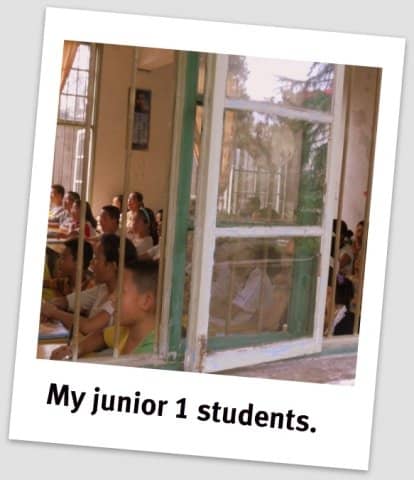I love traveling and I find China an extremely interesting place in terms of culture, tradition, history and food. Nevertheless, I came here not only to sightsee but mainly to work as a teacher, to get more teaching experience, find out whether teaching is what I really want to do for a living in the future or not, improve the English speaking capabilities of Chinese students, inspire them, gain their interest and motivate them to speak English. Wow, as you can see there are many goals, aims and plans but only 8 months of teaching (not including bank holidays and winter break).
Quick Navigation
ToggleHow it all started…
But… how did it all start and how did I come up with an idea of teaching English in China? It was May 2009 and the first year of my university boned to an end. It was pretty good but I felt like a part-time job in the bar was not enough for me and I didn’t make much progress in my career so I started my second year more ambitiously working as a volunteer in a primary school in Codsall and doing some private tutoring at home. My last year was very productive though and during one of the lectures at the university, my Chinese friend told that qualified teachers are in high demand in China and also told me to have a try and apply for a teaching position once I graduate from the university. So I did. I sent my CV with a covering letter and a recent photo to a few Chinese private and public schools. Got my first interview on Skype a couple of days later and got the job on the spot. Easy peasy :-) :-).
My first impression
What should I start from? There is so much to write: summary of my first semester here- was it good? Did I like it at all? Am I enjoying myself in the school? Ok, let’s start from the very beginning. I arrived in Huayuan (Hunan province), as far as I remember, a week before the first semester kicked off. As I probably mentioned before, I found the people, staff and students extremely friendly, the school seemed to be so massive and awesome and I knew it’s gonna be a hard job when I saw these little Chinese monsters :):):). So that was pretty much how it all looked at first. I was excited though and ready to go and on the first September I entered my first classroom with a smile on my face :).
My contract.

I signed the contract with the high school in Huayuan for a year: September 2011- June 2012, 16 teaching hours, 3 different levels: junior 1, 2 and 3 from Monday to Friday, free accommodation+ free canteen food and decent salary and some travel and contract ending bonuses. For the fact I am not a very experienced teacher and taking into consideration other job offers I have seen, this is pretty good. I shouldn’t complain anyway. I can afford everything in China plus I can save some money so it’s nice. I like the fact that my school is one of the best in Hunan province so it will look quite impressive in my CV. Additionally, my job is absolutely stress- free, nobody controls me, I can plan my own lessons as I want to, I don’t need to attend school and staff meetings, all weekends are off and I can’t work more than 4 teaching hours (45 minutes) a day. So this is pretty much how it all looks. In general, I was very lucky as I found this offer on the Internet and some of my friends found it risky but so far so good, everything has been really amazing except the fact there are too many students in the classroom, more or less 80 in every class which is kind of normal in China. My students always leave me speechless and absolutely exhausted but at the end of the day I really enjoy myself!! Moreover, there is a lack of communication between me and the teachers which is sometimes frustrating. I am never informed about any schedule changes in advance, always find out 5 minutes before my class starts, for example I got up this morning at 8 am to start my class at 9.10. I come to the office, grab my speakers and I am just about to leave when one of the teachers says “The schedule has been changed. You have no class now. Come back at 14:30. Have some rest”. I thought to myself: “Yeahh, thanks guys for letting me know! I might have stayed in my bed longer but who cares”. Apart from this, everything is good here.The teachers are extremely helpful, they care a lot about me, we spend way too much time with each other though. Sometimes I think I speak with them more often than with my mom. They are so funny and the way we communicate: gestures and Chinglish (Chinese and English), it looks so childish and silly but at least we try our best.

Unfortunately, I have heard of many cases when foreign teachers were not satisfied with the schools at all. There are always many scams so be aware of anything suspicious. Some schools promise an excellent salary, free food and accommodation and Z visa but in reality they always find some excuses not to pay you well and make you pay for your Z-visa. The fact that China has a huge demand for foreign teachers does not make everything perfect and easy. One of my friends got a job at a picturesque seaside- all seemed to be great at the beginning. Nevertheless, when he got to the school, the headteacher (after seeing his first class) reproached him for a lack of energy in the classroom and dropped his salary to 50% (of course the excuse was ridiculous!) and what’s more the flat he was supposed to live in was a mess. Another example: my good friend has been sent to three different provinces by one incompetent company and faced many financial problems because he kept spending more on accommodation and travel, the schools have not paid him on time and they didn’t want to even help him with applying for visa as they had no certificate which would allow them to employ foreign teachers in the school. Of course, there are much more stories like this but it is not the point of today’s note. It is another lesson to learn: don’t trust anyone, always be ready for some extra expenses in cases the school you are planning to work in is not competent, and make sure you work legally with your Z visa.

But the good news is China is one of the few countries in the world where demand for English teachers exceeds the supply so that means it is quite easy to find a job without making a lot of effort.
Requirements.
The first and the most important requirement is to be a foreigner, preferably with a light complexion aged 24-60 (you don’t need to be a native speaker to work as a ESL teacher). It is much harder for dark-skinned Asians to find a job. Chinese are so crazy about my hair color and my pale face. It’s a huge advantage here. The second requirement is a higher education diploma (masters, BA or PhD). Of course TEFL or TESOL graduates are in the best position. I have done mine with ITTT. The third requirements is an experience- they say minimum of two years but if you are Caucasian and you have your diploma they don’t care about your experience, the training is most of the time provided anyway. What if I do not fulfil some of the requirements? Impossible is nothing in China. All rules and requirements are flexible especially when the school is in need of a teacher. The schools can turn a blind eye on the lack of diploma or experience but you won’t be able to obtain a working Visa so it means you work illegally. No working visa= non-receipt or non-salary contract with the employer so they can dismiss you anytime.
A brief description of my work

Before I came to China I had prepared myself for a completely different working environment and a great deal of pleasant and unpleasant surprises outside of work, some call it “cultural shock”. I did a decent research on how working as a ESL teacher looks like in China, what my duties are and what I should avoid doing in my classroom. To start with, the same teaching and related duties are much less onerous than for example in any European countries. My job is to teach the oral English so the work is limited to conducting the lesson, there is hardly any paper work, a minimum of bureaucracy. However, having 80 students in the classroom is not easy and if I wanted to practice the oral English with all of them I would spend days and days on it. Moreover, Chinese students are afraid of speaking so it is an extra job for me to encourage them to speak out and make sure they enjoy learning English. Classes last 45 minutes and my school is well equipped with a projector, board, chalk and printer. A playground and outdoor play areas I have dreamed of as a child. Nevertheless, there is neither air conditioning nor heating in the classrooms so in winter I teach with my gloves and hat on and during the summer I sweat like a pig! My students are lovely, they always smile and try to make a conversation with me outside the classroom. They are all kind-hearted however it sometimes happens when I need to raise my voice a little bit when they cross the line while talking and not paying much attention on what I say. I realise that they don’t understand me very well (especially my Junior 1 and 2 students) so I use my hands and gestures to explain everything as much as possible. I also learnt some Chinese words such as “Please be quiet!”, “Open your books, please”, “Let’s write it down”, “Turn the light off” and use it in case they have no idea what they are asked for during the lesson. Most of my students lack of discipline so I try my best to maintain a discipline by treating them like my friends and the classroom as a place where we can all have fun and relax. Moreover, the students are not disciplined at all, which was a surprise for me as I thought the teachers in China are much stricter with students than in Europe, but as it turned out, that isn’t true. The students are used to eating and drinking in the classroom and they often break the rules, for example “no phone in the classroom” rule.
How do I prepare my classes to satisfy my monsters?

Basically, I prepare my classes according to TESOL course recommendations. I divide them into three different stages. I start my class with an engage stage to gainstudents’ interest, get them involved in the lesson, warm them up by playing various games (partner information share, sevens, memory games, word linking, filling in the gaps, anagrams), having discussions with them (what did you do last weekend? information research, finding out information) and sharing with them some interesting pictures and histories which makes them back on the track of using English again. After 8 minutes, I go from engage to study stage where I explain the language, teach them new vocabulary, language constructions (drilling in pronunciation, spelling, word order, analysis of the word, tongue twisters, hangman, word search, filling in gaps and crosswords). The class finishes with activate stage where I encourage students to use any or all of the language they know and they’ve learnt, they should use it as freely and communicatively as possible (role play, surveys, drawing pictures or producing materials (leaflets), debates, discussions, story building, interviews). So far, my students seem to be enjoying my classes, we crack jokes together, I always keep them updated on how my family and friends are doing and what places I have been to or I’m going to visit next. My lessons go smoothly and I am much more confident than before.

Nevertheless, teaching English in China is a challenge especially when you try your best to teach these little monsters some good English. Most of them lack motivation to learn English and easily give up. They are also overtired with homework and stressed with exams therefore it is sometimes extremely difficult to attract their attention. You sometimes need an endless energy to deal with kids. I guess there is still a lot for me to learn but I can see the results of my hard work and I am even more determined to reach my goal which, in this case, is to provide the best teaching possible.
Here are some website through which you can find some ESL positions in China:


